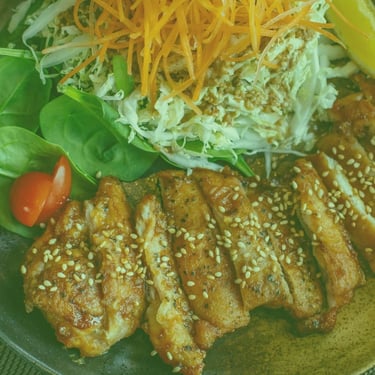Adult ARFID Therapy in Newark, New Jersey
Specialized Treatment for Avoidant/Restrictive Food Intake Disorder




The text from your supervisor at Prudential Financial arrives Tuesday morning: "Client dinner Thursday at Fornos of Spain to celebrate closing the healthcare deal. The whole team will be there." Your stomach drops, not because you don't want to celebrate, but because navigating a Portuguese restaurant with colleagues feels impossible when your safe foods list includes maybe 8 items.
You've become skilled at deflecting these opportunities. "Family commitment" for the quarterly team dinner. "Not feeling well" when the Newark startup you consult for suggests lunch at Dinosaur Bar-B-Que. "I'll catch up with you afterward" when colleagues head to Mercato Tomato for their weekly networking lunch.
In Newark's competitive financial and healthcare sectors, where relationship-building happens over shared meals, these missed connections directly impact your earning potential. You watch others advance through relationships built during client entertainment while you maintain professional distance to protect yourself from food-related anxiety.
Expert Adult ARFID Therapy Serving Newark
Quantifiable Missed Opportunities
In Newark's financial district, declining client entertainment opportunities costs approximately $20,000-35,000 annually in potential salary advancement. Missing networking events at venues like The Prudential Center or downtown restaurants means lost connections that typically lead to job opportunities worth $25,000-50,000 salary increases.
When you avoid travel assignments that include group meals – whether to New York financial conferences or healthcare industry meetings – you're potentially missing promotions worth $30,000-60,000 over 2-3 years in Newark's high-earning sectors.
Daily Productivity Drain
Your mental energy gets consumed by food logistics instead of work performance. Spending 45+ minutes planning each meal, researching restaurant menus before business meetings, and managing the anxiety around food situations drains cognitive resources that should be directed toward career advancement.
The afternoon fatigue from inadequate nutrition affects your performance in client presentations and important meetings, potentially impacting annual performance reviews and bonus structures common in Newark's financial sector.
Healthcare and Supplement Costs
Regular doctor visits at University Hospital or Newark Beth Israel for vitamin deficiencies and digestive issues cost $2,500-4,000 annually. Prescription medications for acid reflux, specialized vitamins, and meal replacement products add another $1,500-3,000 per year.
Lost productivity from health-related sick days and reduced work capacity costs an estimated $3,000-5,000 annually in missed opportunities and reduced performance ratings.
The Real Career Cost of ARFID in Newark's Professional Scene
Your Brain's Protective System is Overactive
ARFID operates in your nervous system's threat detection center, the same area that keeps you safe from actual dangers. When you see certain textures, smells, or foods, your brain genuinely perceives them as threats and activates protective responses: nausea, gagging, panic, or the overwhelming urge to leave the situation.
This isn't about willpower, maturity, or "being picky." Your nervous system has learned to categorize certain foods as dangerous, and it's doing exactly what it's designed to do – protect you from perceived threats.
Why Standard Solutions Fail
Forcing yourself to eat through willpower activates your threat system more intensely, reinforcing the brain's belief that these foods are dangerous. Well-meaning suggestions to "just try it" or "hide" challenging foods in familiar ones often make ARFID worse by increasing anxiety around eating.
Generic therapy approaches that focus on thoughts and behaviors miss the neurological component entirely. You need treatment that specifically retrains your nervous system's responses to food, not just strategies for managing anxiety.
Understanding ARFID as a Neurological Response, Not a Choice


Cognitive Behavioral Therapy for ARFID (CBT-AR)
CBT-AR recognizes that your brain's protective responses around food are trying to keep you safe, even when they're overactive. Instead of fighting these responses, we gradually retrain them through structured positive experiences that your nervous system can actually absorb.
For example, rather than forcing yourself to think "this salmon is fine" during a client dinner, you learn to examine the specific thoughts that trigger your alarm system ("the smell will make me gag") and test these beliefs in microscopic ways that feel safe.
Graduated Exposure Designed for Professional Settings
Professional exposure therapy starts so small it barely activates your threat system. We might begin with reviewing restaurant menus online, then sitting near people eating challenging foods, then perhaps touching or smelling new foods in controlled environments.
Each step is designed to keep you in your "learning zone" where change is possible, rather than survival mode where your brain just wants to escape. This is completely different from forcing yourself through business dinners and hoping for the best.
Somatic and Nervous System Regulation Techniques
These approaches specifically target the neurological patterns that maintain ARFID. Instead of trying to calm down after you're already activated by food triggers, you learn to recognize early signs of your threat system engaging and intervene before it escalates.
You develop the ability to distinguish between actual danger signals and false alarms, so your body's communication becomes helpful rather than overwhelming during professional eating situations.
My Specialized Neurological Approach to ARFID Treatment
Expanded Professional Food Flexibility Within 15-20 Sessions
Clients typically go from 8-10 safe foods to 25-35 options they can eat comfortably. This means finding workable menu items at 90% of Newark's business dining venues, from casual spots like Brick City Bar and Grill to upscale client entertainment restaurants.
You'll attend quarterly team dinners without anxiety, accept client entertainment opportunities that advance your career, and participate in industry networking events without detailed advance planning.
Measurable Career Advancement Opportunities
With food anxiety no longer limiting your professional interactions, you can:
Accept travel assignments that include group meals, opening doors to promotions worth $25,000-50,000 annually
Build relationships during client entertainment that lead to business development opportunities
Network effectively at industry events, expanding your professional connections throughout the NYC metro area
Take on leadership roles that require entertaining clients or colleagues
Improved Daily Performance and Energy
Meeting your nutritional needs through actual food rather than supplements stabilizes your energy throughout demanding workdays. The mental energy previously consumed by food planning becomes available for strategic thinking and client relationship management.
Many clients report improved afternoon focus during important meetings and better performance on demanding projects within 8-12 weeks of starting treatment.
Return on Investment
ARFID therapy typically pays for itself within 6-12 months through expanded career opportunities, improved work performance, and reduced healthcare costs.
The professional advancement opportunities that become available when food anxiety no longer limits your networking and client relationship capacity often result in salary increases that far exceed the therapy investment.
Concrete Results You Can Expect from Specialized ARFID Treatment
Weekend and evening appointments available to accommodate finance and healthcare industry schedules. Treatment specifically designed for adult ARFID, addressing the neurological responses that maintain food restrictions.
Begin ARFID Recovery for Newark Professionals
Frequently Asked Questions
Q: Does health insurance from major Newark employers cover ARFID therapy? A: Most corporate health plans include eating disorder coverage. I can provide documentation for reimbursement, though payment is typically required at time of service with later insurance reimbursement.
Q: How quickly can I expect to see results that impact my work performance? A: Most clients notice reduced food-related anxiety within 4-6 sessions, with meaningful improvements in professional eating situations within 8-12 weeks. Significant expansion of safe foods typically occurs over 15-20 sessions.
Q: Are there other ARFID treatment options in the Newark area? A: University Hospital and Newark Beth Israel offer some eating disorder services, and the New Jersey Division of Mental Health (1-866-202-4357) maintains referral lists, though specialized adult ARFID treatment is limited in the area.
Q: Can you help with ARFID if I frequently travel for work in the financial sector? A: Yes, we specifically address travel-related food challenges and develop strategies for maintaining progress in unfamiliar business dining situations, which is crucial for professionals in Newark's finance and healthcare industries.
Q: What if my ARFID symptoms get worse during high-stress periods at work? A: We develop specific strategies for maintaining food flexibility during stressful periods, including techniques for nervous system regulation during demanding work cycles common in Newark's competitive business environment.




